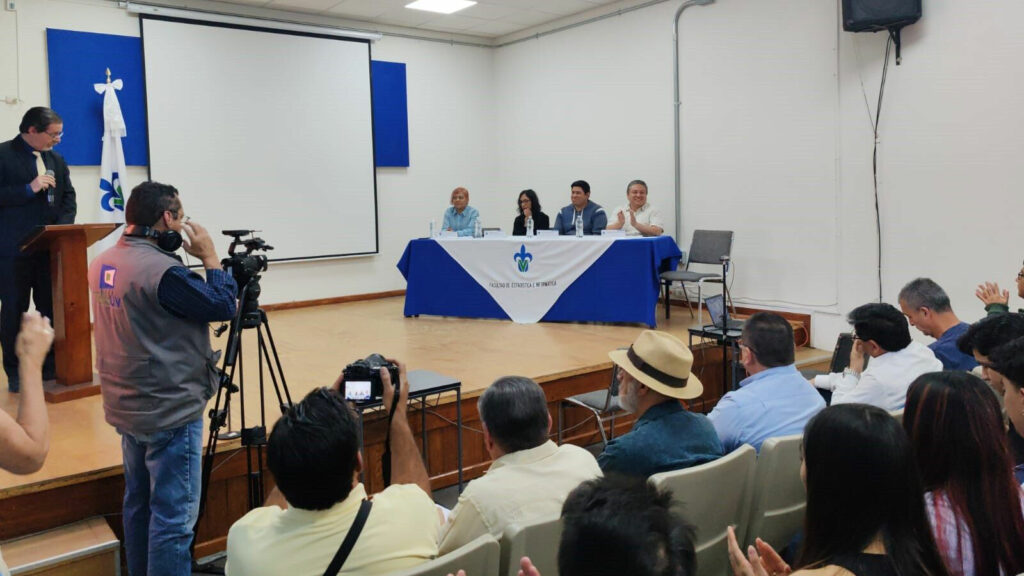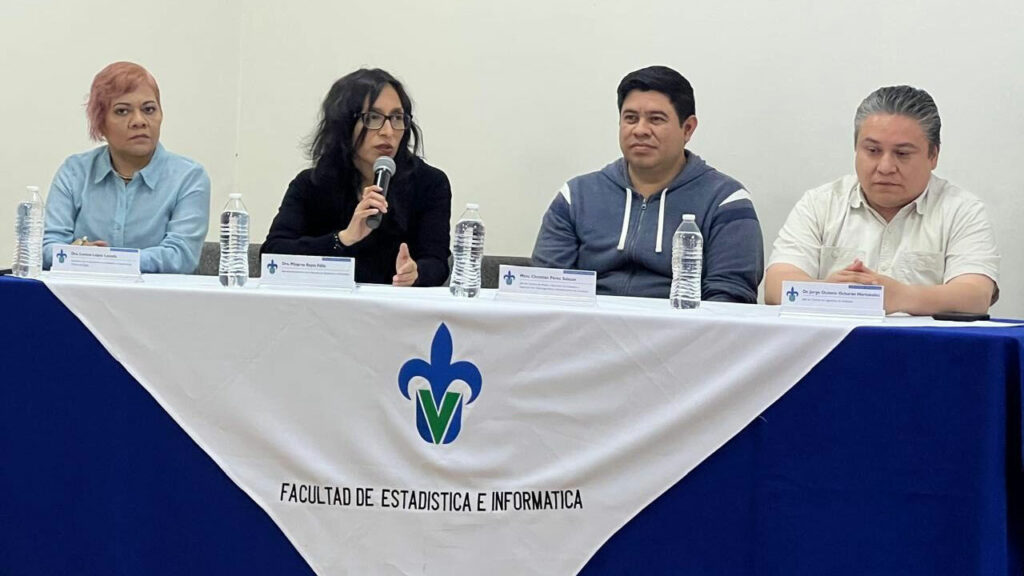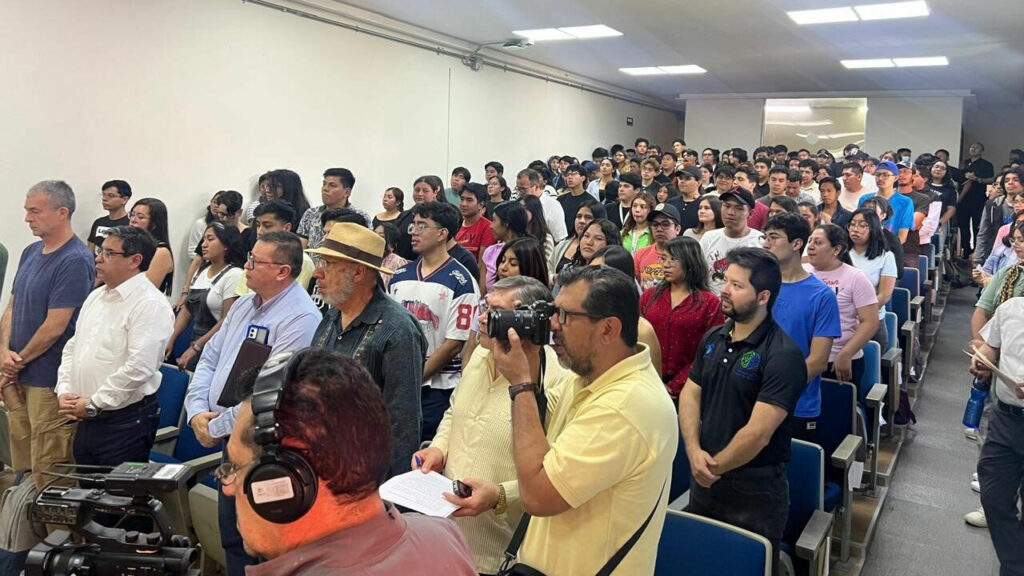
This text, part of the #ODDStories series, tells a story of Open Data Day‘s grassroots impact directly from the community’s voices.



The Conversatory Open Data and New Technologies to Face the Polycrisis, held on 19 March in the city of Xalapa, Veracruz, Mexico, brought together teachers and researchers from different fields with a common characteristic: working with open data. The event took place at the Faculty of Statistics and Informatics (FEI) of the Universidad Veracruzana (UV). It was attended by professors and students from the Statistics, Data Science Engineering and Computer Science courses offered at the same institution.
The event was inaugurated by Dr Minerva Reyes Felix, FEI’s Academic Secretary, and organised by MCD Lorena Lopez Lozada, leader of the Open Data Project in its eighth edition as organiser.
Reliable open data, useful for managing the polycrisis
Lorena López Lozada explained that “the objective of the event is to share, from different perspectives, the current situation where several global crises are happening at the same time and their combined impact is greater than their individual impact, the so-called polycrisis, and how the use of open data allows us to visualise the social context and support decision-making based on reliable information”.
Each of the panelists shared enriching opinions, as their different fields of study allowed for a multidisciplinary discussion. The debate was chaired by MGC José Fabián Muñoz and was divided into three main questions:
- What has been your experience in working with open data?
- What kind of open data can be used to address the polycrisis?
- What do you recommend for the generation of open data regarding infrastructure, security, reliability, among others?
Experience in working with open data
Nicandro Cruz Ramírez, a professor at the Artificial Intelligence Research Institute (IIIA) of the Universidad Veracruzana, began this round of questions. He mentioned that he was fortunate to have open data and to be able to work with it. One example was ecological data, which can be used to analyse climate change and, in this case, the loss of ecological integrity of top predators (large and strong species in the area such as bears, pumas and lions). Creating artificial intelligence models to identify the causes of this problem and assess the impact of future construction projects in biodiverse areas.
In this conversation, Angel Fernando Argüello Ortíz, a professor at FEI, shared examples of how census information has been key to the implementation of projects and the difficulties he has encountered when this information is not freely available. He also expressed that information is power, but that it must be used correctly, as “all power carries a great responsibility, because sometimes it generates benefits, but sometimes it generates disadvantages, so it is important to use it correctly”.
Types of open data to address the polycrisis
Another participant in the discussion was Agustín Fernández Eguiarte, a researcher at the Institute of Atmospheric Sciences and Climate Change at the National Autonomous University of Mexico (UNAM), who is on a research visit to the UV’s Centre for Earth Sciences (CCT). He mentioned that “it is necessary to have climate, climate change, hydro-meteorological and environmental data, but structured as open fair data in unconditional standards or metadata and integrated in data repositories”. As examples, he has developed an open data repository on climate change and tropical cyclones in the state of Veracruz, which includes an interactive visualisation in addition to the databases; and an open data repository on the Pico de Orizaba.
The information from both will be made available on the Internet for those interested in the topics, “because to face the polycrisis we need reliable data and information, with quality control, to support any policy, action or programme to address climate change,” said the researcher.
Ángel Juan Sánchez García, a lecturer at FEI, said that although it is impossible to solve the world with data, it is possible to have an idea of the problems that are occurring at a global level. He mentions that in Mexico some sectors do not have a culture of generating data, which makes it difficult to analyse their own areas. This could be linked to human factors (lack of empathy for sharing data) and resistance to analysis due to possible social alarm (touching on real but sensitive issues).
Recommendations for open data production
To conclude this series of questions, each of the participants shared their recommendations for those using or generating open data. We can divide their opinions into five sections:
- Create a culture of information management. Knowing how to gather information based on project objectives and being willing to share that information and allow others to access and consult it.
- Collaboration. Pupils and students are encouraged to work in teams. Projects are more practical and easier to carry out when a multidisciplinary team works together.
- Technological infrastructure. Ensure the quality, security, reliability and other attributes necessary to work with open data, as a lack of these will limit its analysis.
- Working with other types of data. As Ángel Juan Sánchez García mentions, “we need to venture into other types of non-conventional data”, because in many cases, there is a very rigid idea of what a database is, which limits the variety of analyses that can be carried out.
- Legislation. One of the participants mentioned the need for legislation on the management and collection of information, despite the existence of legislation. In the case of Mexico, the General Directorate of Access Policies of the Secretariat for Access to Information of the National Institute for Transparency, Access to Information and Protection of Personal Data (INAI) prepared a document in 2023, which was presented as a “draft” to the Technical Group of the National Open Data Policy. Subsequently, it was presented to the different feedback spaces that made up the construction of this public policy, proposed within the framework of the Open Mexico Strategy and its corresponding methodology. For its elaboration, the Minimum Criteria and Methodology for the Design and Documentation of Policies for Access to Information, Proactive Transparency and Open Government, approved by the National System of Transparency, Access to Public Information and Protection of Personal Data, and published in the Official Gazette of the Federation on 23 November 2017, were used as a reference. However, this policy has not come to fruition, as INAI has disappeared in the current government administration.
Despite the existence of the Open Data Charter and its principles, governments are not yet committed to having open data in all possible areas of information sharing with citizens.
With the support of the Open Knowledge Foundation and Datopian for the development of the Conversatory, the academic event marked a significant step towards strengthening the promotion and use of open data, as well as the socialisation between students and teachers and researchers, sharing in a healthy environment and also contributing to the integral development of students.

About Open Data Day
Open Data Day (ODD) is an annual celebration of open data all over the world. Groups from many countries create local events on the day where they will use open data in their communities. ODD is led by the Open Knowledge Foundation (OKFN) and the Open Knowledge Network.
As a way to increase the representation of different cultures, since 2023 we offer the opportunity for organisations to host an Open Data Day event on the best date over one week. In 2025, a total of 189 events happened all over the world between March 1st and 7th, in 57 countries using 15+ different languages. All outputs are open for everyone to use and re-use.
For more information, you can reach out to the Open Knowledge Foundation team by emailing opendataday@okfn.org. You can also join the Open Data Day Google Group or join the Open Data Day Slack channel to ask for advice, share tips and get connected with others.








